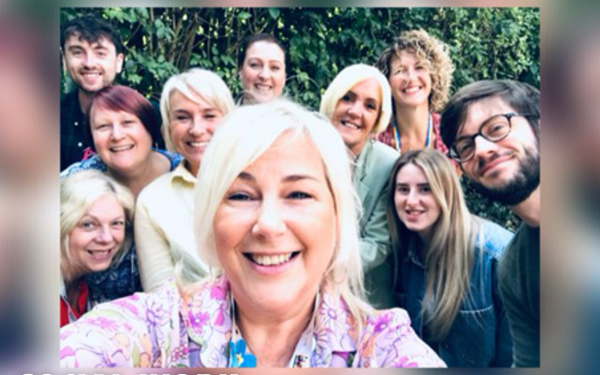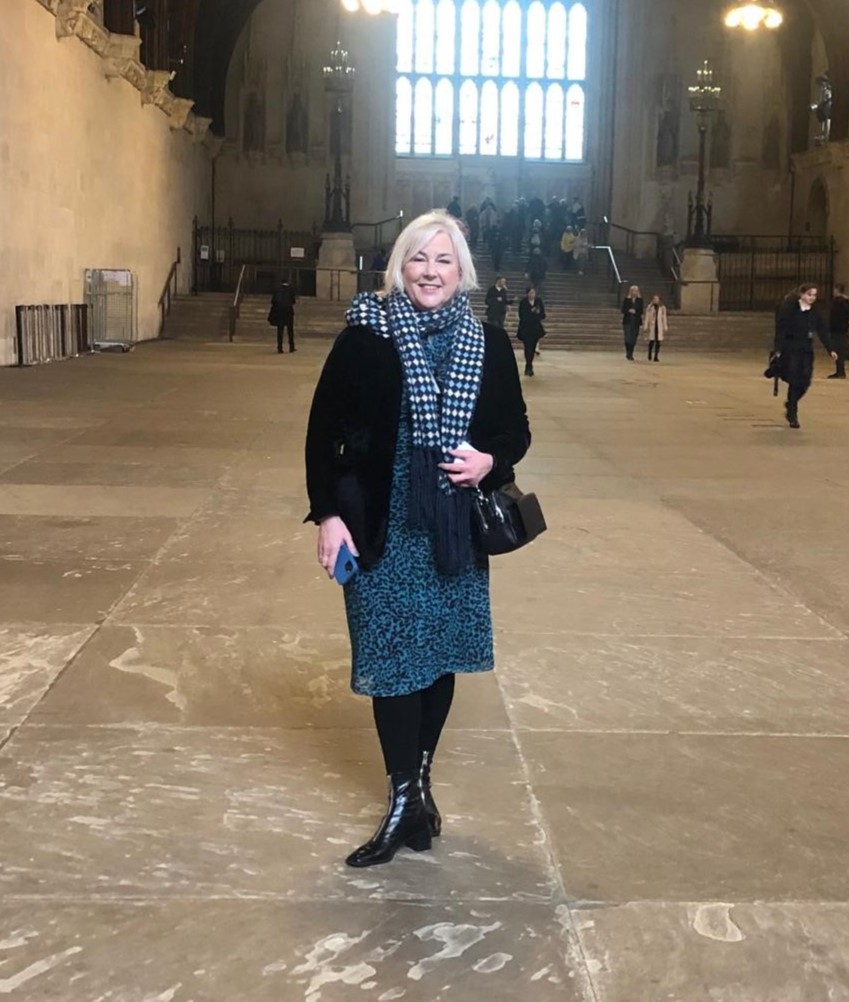
In 2023, Jane Dunne was named the children’s services team leader of the year for her work with the Coventry and Warwickshire family drug and alcohol court service (FDAC).
This was not her first award since becoming manager of the then Coventry FDAC in 2016, with the team winning the public sector children’s team prize at the 2018 Children & Young People Now awards.
In 2021, the service’s success led to its expansion to cover Warwickshire.
Speaking to Community Care, Jane discussed why she believes FDACs are a better alternative to standard care proceedings, her approach to leading a multidisciplinary team and the risks to FDAC teams from constraints on public spending.
What are FDACs?
FDACs are an alternative to standard care proceedings in substance misuse cases, geared towards keeping children with their families, where possible.
Under the model, multidisciplinary teams work with parents to help them tackle their alcohol or drug misuse, including through key worker support, individual or group therapy and referral to other services.
At the same time, specially trained judges undertake fortnightly sessions with parents – in the absence of lawyers – to oversee progress and foster positive working relationships between families, the judiciary and FDAC practitioners.
Research has found that children whose parents are referred to FDACs are more likely to be reunified with their families than those involved in standard care proceedings. However, that study’s limitations meant that it was not possible to draw firm conclusions about how far FDACs caused this effect.
There are currently 13 FDACs in England and Wales
How did you become involved with the FDAC service?

Jane Dunne with the rest of her FDAC team / Photo by Jane Dunne
The service started in October 2015, and I joined in March 2016. I’d always been interested in the interaction between substance misuse and volatile relationships, and how that impacts on an individual’s mental health.
Then a secondment came up for six months to manage the Coventry FDAC service, because we only had temporary funding at that point.
I haven’t looked back. I remember thinking, “My goodness, I only had this for six months and now I’m here eight years later”.
One of the things that stood out to me was that it was a multidisciplinary team. We had a clinical lead, two substance misuse workers, a parenting officer, a children and family worker and three social workers, including a domestic abuse practitioner.
Everybody had their own expertise, but when I joined they were working in silo. I wanted to have a sense of identity as a team and to centre that around improving outcomes for children.
We did a lot of team development and broadened our knowledge and skills. We’ve all learned so much these last few years.
What makes an FDAC a better alternative to standard care proceedings?
In normal proceedings, when a case comes to the court, various assessments are ordered. But the results usually come in closer to the end of proceedings.
So if the hair and blood tests come in and they’re high in alcohol levels, then there is nowhere for the parents to go to demonstrate change because that’s their evidence. And they are expected somewhat to do everything on their own.
FDAC provides that level of scaffolding at a time when they need it. We offer an initial assessment with the experts – and we’ve got all the experts, so they don’t have to join long waiting lists.
The work is trauma-informed, it’s relationship-based. So everybody in the team tries, from the minute you meet the parent, to make them feel as comfortable as possible and build a rapport to support them.
We’re a consistent team. We see [the parent] two or three times a week. A children’s social worker might see them once a week for a parenting assessment in usual proceedings.
At the beginning of the trial, we do a peth test for alcohol consumption and an overview hair strand test of all six drugs [cocaine, cannabis, amphetamine, methamphetamine, opiates, benzodiazepines] because we know that parents are often frugal with what’s going on for them. They might say [they’ve taken] a little bit of cocaine and then when you get the hair and blood tests back it might be crack cocaine.
And then throughout the trial, we will do alcohol breath meter, oral swab and urine tests every time we see them. It helps parents reflect that they might have had a difficult week, because we don’t expect them to be progressing straight away. We want to discuss the triggers, thoughts and feelings around that and what we can put in place.
Celebrate those who’ve inspired you
For our 50th anniversary, we’re expanding our series My Brilliant Colleague to include anyone who has inspired you in your career – whether current or former colleagues, managers, students, lecturers, mentors or a prominent past or present sector figures whom you have admired from afar.
Nominate your colleagues by either:
- Filling in our nominations form with a letter or a few paragraphs (100-250 words) explaining how and why the person has inspired you.
- Or sending a voice note of up to 90 seconds to +447887865218, including your and the nominee’s names and roles.
If you have any questions, email our community journalist, Anastasia Koutsounia, at anastasia.koutsounia@markallengroup.com
Alongside that, we’re looking at their parenting and their child’s needs, we’re running support groups and doing specific interventions. We try to understand what’s happening underneath and get to the root of the problem, to create long-lasting change.
We also build long-lasting relationships with them. A male parent who’s had his daughter in his care for four years now pops in for a cup of coffee every now and then. We talk about lifelong links for children but, if a parent has opened up to a group of professionals about their difficulties and were supported on their journey, it’s powerful to continue that relationship.
If they’re in a crisis in the future, they’ll need somebody to reach out to and some people don’t have anybody.
We are also looking at a permanent plan for the children. Reunification is what we are working towards, but where that is not possible, we look towards care with family or the possibility of reunification in the future.
FDAC has more reunification than in usual proceedings, although it takes a little more time to get there.
What happens within your service if reunification is not possible?
Even if children aren’t reunified, there is an opportunity for parents to still work on their recovery and their parenting.
If a child is put up for adoption, no matter how painful that is, if the parent can understand that they’re not in a position to care for their child, they will often say, “I consent to my child being adopted because I know I can’t meet their needs. It’s not because I don’t love them.”
And they get a lot of support with that within FDAC – it helps change the language of the negative stigma around not being there for your children. We also offer some post support, and, later on, people can still call us for advice.
For example, a young woman we worked with last year contacted me recently and said, “I’m in a new relationship, I’m pregnant, and I need to demonstrate that I’m sober”. So we were able to give her some advice.
What is your approach to managing a multidisciplinary team?

Jane Dunne during a visit to Westminster / Photo by Jane Dunne
I think it’s about shared values, and understanding our limitations and knowledge.
I was terrified of managing the substance misuse worker because of my limited knowledge. I thought I knew quite a lot about drugs and alcohol, but when I came here, I [realised], “Oh my gosh, I know nothing”. It prompted me to study more and get a diploma in substance misuse and addiction.
I’m learning as much from [workers I manage] as they’re learning from me. I wouldn’t say it’s been an easy process – but it’s about furthering your understanding. For example, I developed my learning around cognitive behavioural therapy and trained in motivational interviewing.
I wanted the whole team to take that approach, so we provided training for them. We did a course on foetal alcohol syndrome and foetal alcohol disorder together because, although you’ve got that discipline, you need to layer up your knowledge and skills base – whether you are the children and family worker, the team manager or the clinical lead.
They also know they are safe to come to me; I’ve got their backs. I think most of my team are comfortable reaching out if they’re struggling.
As a manager, if I need to do casework because we’re struggling, then I’ll do that. But I’ll also do the supervision, the advocacy in the court, the strategic stuff.
I don’t see my role as just being one thing. It’s whatever it takes to keep the service going so that families have the best experience and that people feel safe to work.
Does the limited number of FDAC teams put pressure on you?
We have 13 FDAC teams now – we recently lost Kent and Cardiff – and there is an awful lot of pressure around funding and continuing the service.
We’ve been in a very fortunate position, where Coventry could see the benefit of this model and the cost avoidance. Although it might be expensive to set up and deliver, there is an acute saving in the long run.
But local authorities are under a lot of pressure. Many of my FDAC colleagues up and down the country have really struggled, hence the closures.
The judiciary really appreciates this model. They’d like to see it in every court, so it’s not just a postcode lottery and that’s fantastic. But it’s not funded.
Currently, funding comes from different sources. Our current expanded team was setup through a Department for Education grant and is currently funded by Coventry and Warwickshire local authorities.
We are fortunate to have the domestic abuse social worker role funded by the West Midlands Police & Crime Commissioner, but overall the funding is reviewed every two years for the team.
Other teams may have health or public health funding too; it depends on how it was set up.
So what I’d like to see is core funding, so that managers can focus on the service delivery and not worry about whether our service will last another six months or two years. That’s the fragility and reality of it.
What are your goals moving forward?
My goal is to secure the funding for this service moving forward and improve on the offer that we give parents within proceedings and post-proceedings. Because at the end of the proceedings, when children are reunified, parents need support. It’s a time that might test your recovery and your parenting.
The best way for that is through having robust support around them, but also peer support. So that’s families and parents that have been through FDAC problem-solving together, having a community where they can support each other.
My hope would be to have that as part of the programme because many other sites do, but we’ve never had the funding. We manage a graduates’ group, but this is on frugal basis.
What has been a highlight of running this service?
The “graduates”. I think it’s such an achievement when parents come through proceedings and successfully reunite with their children.
We do a little graduation ceremony. We invite them back and they get a certificate and a card from us and the FDAC judge to say, “Well done”. We often buy or make cakes and we have a little celebration.
One parent, who I knew as a child when I was a social worker and was quite a challenging man and had a whole life of criminality, said in his graduation ceremony, “Wow, this is an achievement. I’ve always sat in court. I’ve never been invited to a court.”
For him, it was huge.




 Bournemouth, Christchurch and Poole
Bournemouth, Christchurch and Poole  Hampshire County Council
Hampshire County Council  Lincolnshire County Council
Lincolnshire County Council  Norfolk County Council
Norfolk County Council  Northamptonshire Children’s Trust
Northamptonshire Children’s Trust  South Gloucestershire Council
South Gloucestershire Council  Wiltshire Council
Wiltshire Council  Wokingham Borough Council
Wokingham Borough Council  Children and young people with SEND are ‘valued and prioritised’ in Wiltshire, find inspectors
Children and young people with SEND are ‘valued and prioritised’ in Wiltshire, find inspectors  How specialist refugee teams benefit young people and social workers
How specialist refugee teams benefit young people and social workers  Podcast: returning to social work after becoming a first-time parent
Podcast: returning to social work after becoming a first-time parent  Podcast: would you work for an inadequate-rated service?
Podcast: would you work for an inadequate-rated service?  Family help: one local authority’s experience of the model
Family help: one local authority’s experience of the model  Workforce Insights – showcasing a selection of the sector’s top recruiters
Workforce Insights – showcasing a selection of the sector’s top recruiters 

 Facebook
Facebook X
X LinkedIn
LinkedIn Instagram
Instagram
Comments are closed.